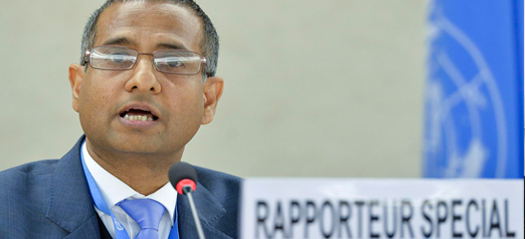
Ahmed Shaheed, UN Special Rapporteur on freedom of religion or belief, (Credit: Jean-Marc Ferré/ UN)
Nadine Osman
Institutional Islamophobia, fear of Muslims and those perceived to be Muslim, have escalated to ‘epidemic proportions’, the UN Human Rights Council (HRC) heard on March 4.
Addressing the HRC’S forty-sixth session in Geneva, UN Special Rapporteur on Freedom of Religion or Belief, independent rights expert Ahmed Shaheed, said that “numerous” States, regional and international bodies were to blame.
In a report to the Council titled ‘Countering Islamophobia/Anti-Muslim Hatred to Eliminate Discrimination and Intolerance Based on Religion or Belief’, he cited European surveys in 2018 and 2019 that showed that four in 10 people held unfavourable views about Muslims. In 2017, some 30 per cent of Americans surveyed viewed Muslims in a negative light.
He said that States had responded to security threats “by adopting measures, which disproportionately target Muslims and define Muslims as both high risk and at risk of radicalisation”.
These measures include restricting Muslims from living according to their belief system, the securitisation of religious communities, limits on access to citizenship, socioeconomic exclusion and pervasive stigmatisation of Muslim communities. Shaheed noted that these developments followed the 9/11 terrorist attacks in the US in 2001 and other acts of terrorism “purportedly conducted in the name of Islam”, institutional suspicion of Muslims and those perceived to be Muslim have escalated to “epidemic proportions.”
He further raised concerns that in States where Muslims are in the minority, they are frequently targeted based on stereotypical ‘Muslim’ characteristics, such as names, skin colour and clothing, including religious attire, such as headscarves (hijab).
The independent expert said that “Islamophobic” discrimination and hostility were often intersectional, such as where “Muslim women may face a ‘triple penalty’ as women, minority ethnic and Muslim…Harmful stereotypes and tropes about Muslims and Islam are, chronically, reinforced by mainstream media, powerful politicians, influencers of popular culture and academic discourse”.
The report emphasised that the critiques of Islam should never be conflated with Islamophobia, adding that international human rights law protects individuals, not religions. The criticism of the ideas, leaders, symbols, or practices of Islam are not Islamophobic in itself, the Special Rapporteur stressed, unless it is accompanied by hatred or bias towards Muslims in general.
“I strongly encourage states to take all necessary measures to combat the direct and indirect forms of discrimination against Muslims and prohibit any advocacy of religious hatred that constitutes incitement to violence”, the UN expert said.
The report also attributes rising anti-Muslim hatred to ‘Harmful stereotypes and tropes about Muslims and Islam’ that ‘are chronically reinforced by mainstream media, powerful politicians, influencers of popular culture and in academic discourse.’
As an example of Muslims are ‘generally underrepresented’ and ‘often misrepresented in the media’ the report cites a study by the European Commission against Racism and Intolerance. It found that between 2016 and 2017 in more than 600,000 Dutch news items ‘the adjectives most used to describe Muslims were “radical”, “extremist” and “terrorist;” in contrast, Dutch people are often described as “known”, “average” and “beautiful.”’
Furthermore, the studies ‘show that media in several countries disproportionately focus on negative angles for news stories involving Muslims, such as reporting on their perceived failure to integrate, and disproportionate media attention is often paid to a terrorist attack committed by Muslims than coverage of terrorist attacks committed by far-right extremists.’
Indeed, a Federal Commission against Racism-commissioned study on the quality of media coverage of Swiss Muslims in 18 print media outlets covering 2014 to 2017 found that coverage largely focused on ‘a lack of will of Muslims to integrate, but only 2 per cent of reporting covered the daily life of Muslims or their successful integration, respectively.’
The Special Rapporteur noted that surges in online anti-Muslim hate are often catalysed by offline “trigger-events” such as terror attacks (including attacks on Muslims), comments by public figures, or political events such as elections or referenda.
In Myanmar, inflammatory statements shared on social media by prominent Buddhist monks have alleged that Muslims are responsible for sexual crimes against Buddhist women.
Muslim women receive more extreme hate speech online than other women: 55 per cent of the most aggressive online hate speech documented by Amnesty India directed at female politicians was directed at Muslim women.
In Europe and North America, prominent politicians, influencers and academics advance a narrative on both social networks and blogs that Islam is innately antithetical to democracy and human rights — particularly gender equality — often propagating the trope that all Muslim women are oppressed.
In China, popular narratives on social media emphasise the incompatibility of Muslim identities with being Chinese and claim that State initiatives attempting to strip Muslim women of their religious identity serve to “rescue” them from being ‘vessels of Muslim reproduction.’
Conspiracy theories drawing on xenophobic and racist narratives about Muslims are also propagated by far-right groups online.
Designed to influence attitudes towards policies meant to promote immigration and inclusion, or to ascribe blame for challenges facing society, such theories include fabrications that immigrant Muslim populations are going to “out-breed” native populations, which are widespread online in Europe, North America, Myanmar and Sri Lanka; and in India, Hindu nationalists have pushed the “Love Jihad” narrative, claiming that Muslim men conspire to marry Hindu women into converting to Islam
In India, the hashtag #CoronaJihad went viral on Twitter following the BJP’s Hindu Nationalist Government announcement of high levels of Covid-19 infection among the Muslim community. WhatsApp group chats and forwarding features have been used, including allegedly by government officials, to propagate disinformation about Muslims, depicting them as criminals or terrorists, and at times including specific calls to violence.
Similarly, in Sri Lanka, disinformation rapidly spread online that Muslims deliberately disseminated Covid-19 in the country, and in the UK, discourse online alleges that Muslim communities were responsible for the spread of Covid-19. Encrypted chat platforms such as WhatsApp or Telegram are also used to spread Islamophobic disinformation, particularly during the pandemic.